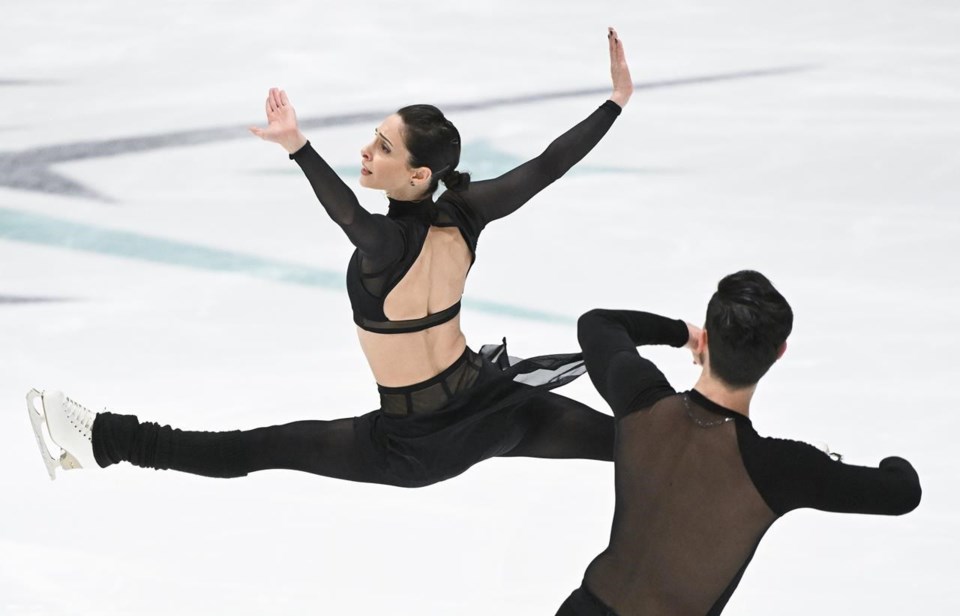MONTREAL — In an exacting sport where much of the competition hasn't yet turned 25, Canadian figure skating pair Deanna Stellato-Dudek and Maxime Deschamps aren't discouraged by their combined age of 72.
They say it's an advantage, because life experience — and not youth — is what’s propelling this pair to medal contention on the world stage.
“As an adult, I feel that I come to the table with so much more as an athlete,” Stellato-Dudek said.
Stellato-Dudek, a 40-year-old from Chicago, and the 32-year-old Deschamps of Vaudreuil-Dorion, Que., are two-time reigning Canadian champions who’ve won three Grand Prix gold medals in the last two seasons. They also placed first at the Four Continents Championships last month in Shanghai and rank second in the International Skating Union’s pairs standings.
The self-described “least likely” partners are top Canadian podium hopes at this week’s world championships in Montreal, which begins Wednesday with the pairs short program at the Bell Centre.
Stellato-Dudek says being older and smarter helps her make quicker corrections. Her maturity increases her discipline in taking care of her body. And despite the perceived notion that children have the best imaginations, she believes she’s more creative than ever with the ideas she brings to their lifts, spins and twists.
The life experience comes into play with how the two connect as partners on an emotional level — an essential element to skating in pairs.
“I've been in love, I've had heartbreak, I've experienced life,” Stellato-Dudek said. “It's easier when you've had it and experienced it in real life to bring it onto the ice."
"When we have to express the emotion on the ice, we understand that emotion and we can really express it,” Deschamps added. “We bring those kinds of memories that make it be real on the ice."
That didn’t stop people from raising their eyebrows when the pair teamed up in June 2019.
"When people heard that I was gonna skate with him for the first time, they're thinking … 'what?'" she said.
Stellato-Dudek was 36 at the time. A world junior championship singles silver medallist in 2000, she retired at 17 due to a chronic hip injury before returning to the sport 16 years later as a pairs skater and eventually moving to Montreal to join forces with Deschamps.
Meanwhile, Deschamps was 28 and unsure of his figure skating future after running through eight different partners.
The combination with Stellato-Dudek, however, appears here to stay through the stated goal of competing at the 2026 Olympics.
"She has a fire, a fire I've never seen in any skater,” Deschamps said. “She's dedicated to another level.”
Veteran coach Josée Picard, much like the pair themselves, believes their age is at the heart of their success, instead of being a detriment.
“They don't have the same mindset as teenagers,” Picard said. “That alone makes them special and that's their strength — they treat it like a job and they’re ready to do anything to reach their goals.
“The fact they're here at the age they are, doing something phenomenal, it's because they really have the desire to succeed, they're ready to do everything it takes.”
The daily routine involves arriving at the rink over an hour before practice to warm up, rehearsing movements off the ice and skating for three hours. Some days, they’ll add in 1 ½ hours at the gym.
Once home, Stellato-Dudek does extensive stretching to ensure she recovers for the next day.
“Of all the skaters I've had, she's in the top shape,” said Picard, who has coached for 50 years. “She's mature enough to take care of her body so it makes a big difference."
On the mental side, they do “Neurofeedback,” a form of brain training. It’s a process that caught Stellato-Dudek’s attention when NFL quarterback Kirk Cousins revealed he did the training in the Netflix docuseries “Quarterback.”
The training involves watching a television screen that's gradually closing and conditioning your brain to concentrate a certain way, according to Deschamps, who says it has helped him manage his ADHD.
'SUPPOSED TO BE THERE'
Montreal was slated to host the worlds in 2020, but the COVID-19 pandemic shut that down.
At that time, Stellato-Dudek was waiting to be released by U.S. Figure Skating to compete for Canada internationally and the pair wouldn’t have featured in the event.
"Someone said to Maxime and I that when it was cancelled, it's because we were supposed to be there,” Stellato-Dudek said. “It's pretty serendipitous."
Last year, Stellato-Dudek and Deschamps placed fourth at the world championships. Despite saying their goal this year is to have fun and leave the ice happy with their performance, they’re aiming a touch higher.
“We would be remiss to not say that we want to be on the top of the podium, in our home country, in our hometown, where we live,” Stellato-Dudek said.
Part of their performance will pay tribute to Quebec. They'll skate to Cirque du Soleil's "Oxygène" in the short program, followed by "Interview with a Vampire" in the free program.
The pairs competition wraps up Thursday night with the free program. The world championships go through Saturday night with the men’s free program.
This report by The Canadian Press was first published March 19, 2024.
Daniel Rainbird, The Canadian Press



